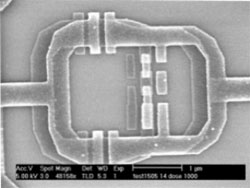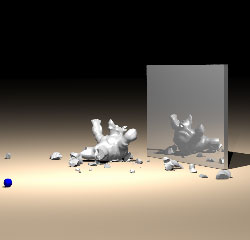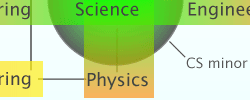Education
Physics: A step to the side

Out of the six degrees of computer science, Physics is probably the furthest specialization from Computer Science. You might be inclined to say it’s connected to Computer Science only through intensive use of Math, which happens to also be present in Computer Science. However, there are a lot more links under the surface.
One of the biggest buzz-words of this decade is “Quantum Computing”. The advantage is that quantum computers have “qubits” (quantum bits) that are not just the zero state or the one state, but rather quantum superpositions of the two states, and as such these computers use an entirely different set of algorithms to solve certain problems than classical computers use. In the quest to build a quantum computer, there are a lot of questions fundamental to Computer Science that must be answered: in particular, we must design the algorithms that a quantum computer would run, and we must also design an error-correction scheme to lower data loss due to decoherence of quantum superpositions. In this burgeoning field, there is room for computer scientists with physics knowledge. More importantly, however, there is lots of room for physicists with strength in computer science.
To be honest, if I were to draw a map along the lines of what the six degrees is all about, I would be inclined to put Mathematics at the centre and branch fields like Computer Science, Physics, Applied Math, Pure Math, Combinatorics and Optimization, and Computational Math. I find Computer Science fascinating at times; it’s an enormously fun field to study. However, computers are nothing more than a tool to improve our efficiency. As such, studying Computer Science for the sake of improving the realm of computers is unappealing to me. I am far more inclined to use computers to further some other field. I’ve chosen to study Mathematical Physics at the University of Waterloo, a field where I can combine the theoretical aspects of Physics with a solid understanding of Math. Coming out of these two fields, programming ability will usually be essential to your jobs. However, you won’t be a code monkey writing some API inside a rigid framework; you won’t be writing documentation; more likely, you’ll be doing simulations or analyzing experimental data.

Where else does Computer Science and Physics intersect? Aside from Quantum Computing, most intersections lie in the realm of simulations or networked supercomputing. Ron Fedkiw’s page is an excellent expose of cool physics simulations of macroscopic bodies. Perhaps more interesting than that is simulation of atoms and molecules: protein folding or interactions between test drugs and certain enzymes, to further the field of biology, which, while physics dominated the 20th century, has been predicted to dominate the 21st century. These projects require enormous amounts of computing power, but at the same time are also separable into many smaller problems; as such, they are ideal for networked computing.
So if you’re like me and enjoy writing code from time to time or designing algorithms, yet don’t see yourself as a code monkey or would rather apply your Computer Science knowledge to another field, consider studying Math and/or Physics. You could still minor in Computer Science. In terms of an undergraduate degree, this often allows you more flexibility in the particulars of Computer Science you study. You might focus your courses on scientific computing, or perhaps you might even go for a minor in Computational Math and learn about simulations. I think we can agree that Computer Science is present to some degree in most scientific (Math, Science, Engineering) studies, so a minor in CS gives you that extra diversification that can set you apart.
 compare Physics with related fields in 6 Degrees of Computer Science.
compare Physics with related fields in 6 Degrees of Computer Science.






I’m really interested in quantum computer’s.Soon we will have a core courses about quantum computer’s at our studies – Physics in the Adam Mickiewicz University in Poland and i’m itch for it.
What do You think – When will be establish the first quantum computer ? In near or further future ?
PS.
Sorry for my bad english
Reply to comment
I would think that would depend on your perception of a computer. There are prototypes out there already, but this new technology is at the stage equivalent to vacuum tubes for digital computers. It might be really cool to get into Physics, because you’ll be right there as the technology develops.
Reply to comment
Yeah, it’s hard to say. The biggest problem right now tends to be decoherance. How do you get the qubits to be sufficiently isolated from the environment such that, while performing the quantum computation, they will not be “observed” and hence collapse from their quantum superposition into a purely up or down state (think Schrodinger’s cat here)? But we also need a set up where, when we want to collapse the qubits, we can, and also then measure what state comes out. So there’s that, and then the second big problem tends to be entangling many qubits together in a *scalable* architecture. I really don’t know how long it will be before we get a “quantum computer” (capable of doing something more than our current classical computers can do), but I know there will still be a lot of work to do even after that first breakthrough is made, so this field will last long enough for the current generation to get involved.
Reply to comment